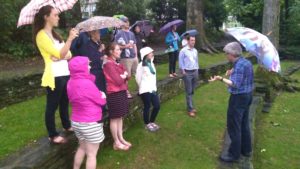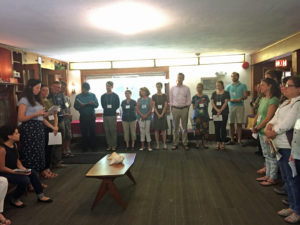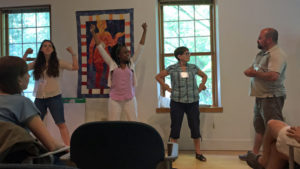AASHE Sustainability Professionals Retreat offered facts, fun and forward-thinking
“The work you do is incredibly difficult.” It was the second time in a month that someone had said that to me. The first time, it was like the shock of cold water hitting me in the face.
But this time, it wasn’t my board members telling me that not everyone can do what I do. It was the presenters at the AASHE Sustainability Professionals Retreat – people who had toiled in the trenches and were about to tell us the secrets of their own success.
Within the tranquil enclave of the Pendle Hill Quaker community, 45 passionate, committed advocates for wise and respectful use of our planet’s resources had come together, in what may be the most challenging times for our field, to share their concerns, expertise, and hopes for the future.
Participants came from nearby and far-flung, large and small, urban and rural organizations, but as we started to talk across our team tables, while breaking bread at mealtimes, or in informal groups, it became clear that we all faced similar issues:
- Getting colleagues to recognize the urgency of the climate change timeline;
- Demonstrating the impact sustainable practices have on the environment and the bottom line;
- Convincing administrators to commit appropriate funding;
- Persuading our peers to take remedial action; and
- Spreading the word
– all while grappling with our own mental, emotional, and physical exhaustion.
 An opportunity to restore our own resilience
An opportunity to restore our own resilience
While the Retreat did include some “walks in the park,” such as a rainy-evening tour of the Scott Arboretum (the campus grounds of Swarthmore College) and some light-hearted silliness, the learning sessions were intense and packed with information. It was a lot to absorb in three days. Two months later, I’m still processing.
Here are my initial takeaways:
- The work we do is very difficult. Stop for a moment and think about that. I heard stories from people who had been tasked with managing everything from light bulbs to landscaping; whether to purchase electricity from an existing solar farm, or build their own wind farm. As I examined my own experience, I realized that, in addition to the environmental science and gardening that are the mainstays of my work, I have to call on experience in these disciplines as well:
- Geology
- Meteorology
- Agronomy
- Hydrology
- Landscape Design
- Engineering
- Planning
- Analysis
- Administration
- Finance and Operations
- Volunteer Coordination
- Marketing and Sales
- Presentation and Public Speaking
- Psychology
- Sociology
- Systems and Technology
How many hats do you wear? Give yourself a pat on the back – the work you do is incredibly difficult!
- Contrary to popular belief, progress does not occur along a straight line
Leith Sharp not only told us that the work we do is difficult and exhausting, she showed us why. Shepherding a sustainability project through an organization is not a straightforward process. Even though the official story at the end of a project makes it look like everything happened sequentially, step by step, the reality is that there are many twists, turns, and tangents along the way to the finish line.Navigating through the obstacles that pop up like targets in a carnival game requires time and skill, in addition to knowledge. Two complementary operating systems are necessary for success: The traditional hierarchical “command and control” top-down system that we’re familiar with from corporate and academic models, and a different, more interactive “adaptive” system.Traditional Operating Systems are setup for creating efficiency and continual improvement, not innovation.Adaptive Operating Systems develop new ideas and explain how they will work. They involve many more strategically-chosen players outside the formal management structure, as well as multiple project iterations and refinements to get buy-in from the folks in this invisible web. These are colleagues who share our values or purpose, and can help us work across disciplinary or institutional boundaries. We ignore them at our peril.
- Acknowledge your power. You have a lot more than you think.
The complex and interwoven specialized knowledge that sustainability professionals hold scares people. Most administrators are not risk-takers; it’s easier for them to just say “no.” Especially if we’re the only ones advocating for our projects.What appears to be stonewalling, personal animus, or failure to care on their part could just as easily be fear of making a costly mistake, inability to see how your project meshes with their area of responsibility, or simply unwillingness to admit that they don’t have the knowledge base to evaluate the project.The solution is to engage collaborators in a shared purpose, in an atmosphere that feels stable and safe. And that was the hub around which all of the Retreat’s sessions revolved. - Emotional Intelligence is critical to getting buy-in
The vast store of arcane knowledge that is the basis of our power gets us nowhere without good interpersonal skills. Lizza Robb’s advanced track focused on four skill sets and explored how they contribute to our ability to relate to others. “Cheat sheets” provide a list of behavioral indicators to help recognize specific capabilities in ourselves and others.Other tools in this kit include an analysis to help recognize critical stakeholders, a variety of self-assessments, and, because no one person can do everything, suggestions on how to triage and set priorities.One recommendation I was able to use immediately is to create a place, a “parking lot,” to hold incomplete projects or big ideas that can’t currently be acted upon. - Self Care
Build Personal Resilience by establishing healthy go-to coping strategies and using them, such as:- Sleep
- Meditation
- Mindfulness
- Gratitude
- Downtime
- Nutrition
- Flow – master a skill that isn’t work-related.
- Maps – If you don’t know where you’re going, any road will take you there
Start with a POP analysis: Ask:- Purpose – Why are we undertaking this project?
- Outcome – What do we want to accomplish?
- Process – What steps will we take to achieve these outcomes and fulfill the purpose?
 It’s human nature to focus on what’s not working and our jobs require us to solve thorny problems. But the Appreciative Inquiry technique encourages us to ask what’s working well and why. And then, doing more of that.
It’s human nature to focus on what’s not working and our jobs require us to solve thorny problems. But the Appreciative Inquiry technique encourages us to ask what’s working well and why. And then, doing more of that.
Leith Sharp and Chris Steuer offered a case study of Millersville University’s innovation process, which used both Forensic and Forward-Flow Mapping. Forensic mapping analyzes a (successful) program to understand the actual path the project took from concept to completion. Forward-Flow mapping seeks to mimic that success and engages stakeholders in a co-creation process in the early planning stages.
Aurora Winslade reminded us that our design process needs to be both intentional and fun and that we need to demonstrate our appreciation to our co-creators with a celebration to kick off the project.
As Executive Director of the Sustainable Gardening Institute, I’m a staff of one. It’s easy to get isolated, lose perspective, and feel like I’m spitting into the wind. As Chair of Garden Writers Association’s growing sustainability committee, which meets via teleconference, I juggle a lot of strong personalities who have strong opinions. With more than 20 members, it gets messy.
 So I appreciated the chance to get away from the usual grind, meet some new people, network with folks who care deeply about our planet, and immerse myself in a holistic learning experience. This retreat was filled with music, poetry, storytelling, drama and a dash of hijinks, the perfect prescription for refreshing, renewing, and rejuvenating one’s outlook on life.
So I appreciated the chance to get away from the usual grind, meet some new people, network with folks who care deeply about our planet, and immerse myself in a holistic learning experience. This retreat was filled with music, poetry, storytelling, drama and a dash of hijinks, the perfect prescription for refreshing, renewing, and rejuvenating one’s outlook on life.
Lois is the Executive Director of the Sustainable Gardening Institute and founder of SGI’s Sustainable Gardening Library. She holds an AB in Geology from Rutgers University.